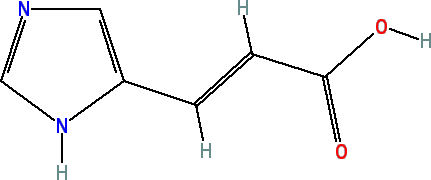Urocanic Acid
Safety Information
Expert Panel for Cosmetic Ingredient Safety
The safety of urocanic acid has been assessed by the Expert Panel for Cosmetic Ingredient Safety. The Expert Panel evaluated the scientific data and concluded that the data were insufficient to support the safety of urocanic acid as used in cosmetics and personal care products.
The Expert Panel’s review of the safety of urocanic acid focused on data concerning immunosuppression and the modulation of photocarcinogenicity. In its review of the clinical data (groups of 10 volunteers exposed to urocanic acid at three different concentrations, induced with a sensitizer, and challenged with three different amounts of the same sensitizer), the Expert Panel expressed concern over the absence of any exposure to UV radiation. They noted that possible reactive intermediates may be produced in the UV-induced isomerization of cis- to trans- or trans- to cis-urocanic acid. These reactions products could not form because the site of urocanic acid application was protected from any source of UV radiation.
Although there was no statistically significant dose-related immunosuppressive effect of urocanic acid found in the study, there was some suggestion that the magnitude of the response may have been less in the volunteers exposed to urocanic acid. The Expert Panel acknowledged the wide spectrum of responses, including some responses to low concentrations of urocanic acid that appeared greater than those at high concentrations, but decided that no conclusion could be drawn from the study that would support a finding of safety or the lack of safety. The other focus of the Expert Panel’s analysis was a published and an unpublished animal study in which urocanic acid exposure was combined with UV irradiation to assess the possible enhancement of photocarcinogenesis. While there were methodological questions about both studies, the Expert Panel decided that neither could be discounted on that basis.
There was general agreement among the members of the Expert Panel that, in the unpublished study’s attempt to repeat the published study, the combination of high UVB exposures and TPA treatments may have been too large and that, therefore, any effect of cis-urocanic acid on increasing the number of tumors could have been masked. As a result, the Expert Panel concluded that only further study would establish firmly whether the immunosuppressive effect of urocanic acid seen in animals is linked in any way to the incidence of cancer in those same animals. Furthermore, while there were in vitro data regarding the formation of DNA adducts, the Expert Panel also noted the absence of any in vivo data regarding adduct formation in animal skin.
The Expert Panel informed the public of its decision that the data on urocanic acid were insufficient to determine whether it is either safe or unsafe for purposes of cosmetic use.
3-Imidazol-4-ylacrylic acid (urocanic acid) and its ethyl ester are listed in Annex II of the Cosmetics Directive of the European Union and are not permitted for use cosmetics and personal care products.
Health Canada does not permit the use of urocanic acid and its ethyl ester in cosmetics and personal care products marketed in Canada.
